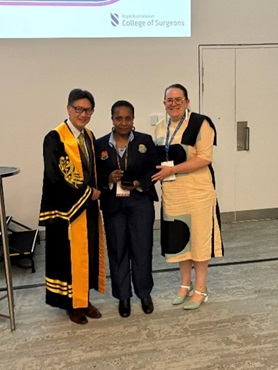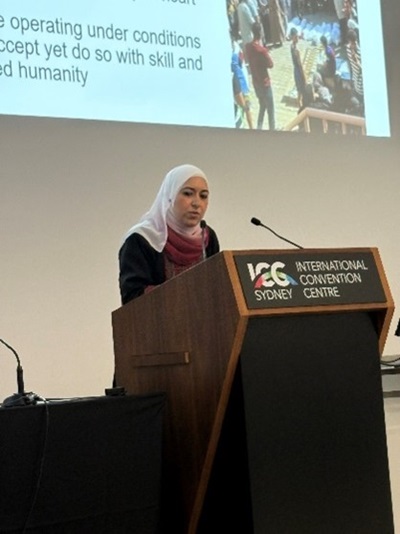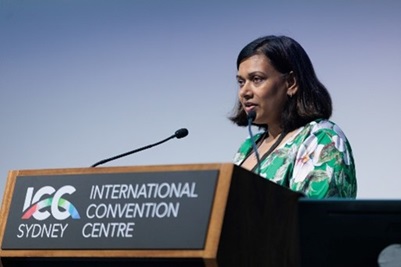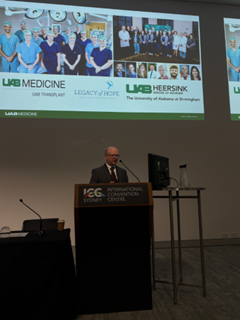2025 | Volume 26 | Issue 3
Missed the final day of the ASC in Sydney? We have the key highlights and our daily newsletters from across the three-day event especially curated for you.
Daily doses
RACS ASC 2025: daily dose newsletter #1
RACS ASC 2025 daily dose #2
RACS ASC 2025 daily dose #3
Rowan Nicks Lecture

L to r: Prof Owen Ung, Dr Esther Apuahe and Dr Ruth Mitchell
Delivering neurosurgery in PNG: Dr Esther Apuahe on resilience, innovation and hope
Dr Esther Roibete Apuahe, one of only two practising neurosurgeons in Papua New Guinea (PNG), delivered a powerful Rowan Nicks Lecture on the final day of the RACS Annual Scientific Congress (ASC), offering a rare and deeply personal insight into the realities of delivering specialist care in a low- to middle-income country.
Papua New Guinea, the largest Pacific Island nation, faces significant health system challenges. Infant mortality sits at 37 per 1000 live births, maternal mortality at 170 per 100,000. The health system is complex, under-resourced, and difficult to access with just one ageing tertiary hospital housing 175 surgical beds. All this to service a population of around 10 million people.
Against this backdrop, the evolution of neurosurgery in PNG has been slow but determined. Dr Apuahe outlined four key decades in the field’s development. From its infancy, in the 1990s and 2000s with early mentors such as Professor David Watters, to the emergence of local neurosurgical training. Today, progress continues through partnerships and collaboration, as well as access to vital equipment including a microscope and endoscope.
“Continued support from the College, including the Rowan Nicks scholarships, makes a real difference,” she said.
But the challenges remain—lack of job opportunities, infrastructure and equipment. While diagnosis is improving, a shortage of trained neurosurgeons puts pressure on capacity. There is a need for local surgical research.
Despite the constraints, Dr Apuahe’s message was one of determination, ingenuity, and the importance of long-term partnership.
RACS Global Health

Dr Bushra Othman
From comfort to crisis: a surgeon’s account of operating under siege
For one General Surgery Trainee from Melbourne’s eastern suburbs, a deep connection to community and an unwavering sense of duty led her far from the familiar—to an operating theatre in Gaza.
In a moving and confronting presentation, Dr Bushra Othman spoke of her time volunteering in one of Gaza’s hospitals—originally in what was considered a safe neighbourhood but has been bombed up to nine times since June last year. The hospital, designed for 150–200 beds, often houses over 600 patients, with thousands more sheltering in its wards and along the corridors.
“There’s no such thing as a safe zone when you’re there,” she said.
Through photos, videos and her own bleak descriptions, she conjured an image of barely functioning infrastructure, chronic supply shortages and food scarcity.
“There is no way to prepare yourself, not even by speaking to those who have gone before you.”
Through the trauma and destruction, Dr Othman also found strength, dignity and humanity among the people of Gaza. She learned lessons about Global Health; the importance of medical education, cross-specialty collaboration and the role of healthcare workers in advocacy.
“Surgeons are storytellers, educators and advocates,” Dr Othman said. She believes they have an obligation to use global platforms to amplify the voices of the communities they help.
In briefs

Dr Pecky De Silva
Dr Pecky De Silva, a vascular surgeon and newly-elected RACS Council member, is challenging the idea surgical training selection should be purely based on merit. She argued true meritocracy requires equity—and equity requires a level playing field. Dr De Silva highlighted how race, gender, and socioeconomic background contribute to discrimination in both medicine and society.
She referenced a UK study showing only six per cent of doctors come from working-class backgrounds, compared to 33 per cent of the general population. She also cited the Tokyo Medical University scandal, where exam results were rigged to favour men.
Performance, or “merit”, is shaped not only by individual capacity but also by systemic interference, which often plays a larger role than many would like to acknowledge.
Xenotransplantation: promising steps

A/Prof Doug Anderson
Surgeons have been making headlines with recent breakthroughs in xenotransplantation—transplanting animal organs into humans. A team in Birmingham, Alabama, including Associate Professor Doug Anderson, is among those leading the charge, building on decades of research dating back to the first successful human kidney transplant in 1954.
With demand for donor organs far outstripping supply, researchers have long explored animal options. Primates proved ethically and practically challenging. Pigs, however, offer a scalable and biologically compatible alternative—if their organs can be genetically modified to avoid rejection.
The CRISPR gene editing tool now allow scientists to "humanise" donor pigs by knocking out problematic antigens and inserting human genes. Recent pre-clinical trials using brain-dead human recipients showed early success and in the last year, six clinical trials of kidney xenotransplantation have also been performed.
While these are significant strides, questions remain about the long-term function of animal to human transplants and which gene edits are essential for success.